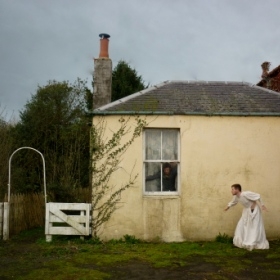Wuthering Heights
Emily Bronte’s novel offers the starting point for a meditation on masculinity in Peter McMaster’s show at Battersea Arts Centre.

“We’re not going to retell a story to you,” the four performers warn us at the outset of Peter McMaster’s all-male Wuthering Heights, making it clear that this is no average adaptation. Sure, there are windswept moors and unruly passions, but Emily Bronte’s famous text acts as a nebulous constellation of references rather than a solid narrative structure.
Instead of slavish adaptation, McMaster offers his audience a multi-faceted meditation on the experience of modern man, taking the problematic and conflicted masculinity of Heathcliff as its implicit catalyst. This startling version of the classic novel is, as McMaster himself puts it, an encounter between the text and its interpreters; the performers “meet the story as ourselves and as men”. The atmosphere and character of the novel are evoked more than its plot, which is only offered in a whirlwind telling right at the start, communicated as much through vivid choreography as through storytelling.
This is literature refracted through both pop cultural and personal lenses. We get blasts of Kate Bush, joyously paired with the iconic dance moves that appear in the music video, while elsewhere the volatile relationship between Heathcliff and Cathy is superseded by reflections on boyhood or contemplations of what it means to be a father. The narrative is always looked at from the edges, be that through the perspective of Heathcliff’s horse or via a process of cultural memory. It’s inventive, fragmented and frequently off-the-wall.
While there is a grain of silliness that runs through the piece, embraced most unapologetically when performing Kate Bush’s gloriously ridiculous choreography, at times the bitter contradictions of contemporary masculinity emerge with all the dark intensity of Bronte’s brooding romantic hero. In the most painful and powerful of these, one performer stands in sad, stoic silence as he is assaulted with a violent torrent of questions, posed with escalating frustration and volume. It is a potent staging of internal discord, at the same time as voicing just some of the many demands thrown at men by modern society. At another point, all four performers cough as though trying to wrench up their very guts, with the suggested desire of expelling something buried deep within.
The tonal inconsistency of the show – veering from the daft to the devastating, the profound to the banal – creates interesting tensions, chiming with the inner conflict acknowledged by the performers. At times, however, this can feel like a collection of sketches rather than a cohesive whole, while it demands a fairly thorough knowledge of Bronte’s text to navigate the performance’s thematic leaps. Whatever its flaws, though, this riff on Wuthering Heights offers an intriguing approach to adaptation, suggesting the riches of scribbling in the margins.












